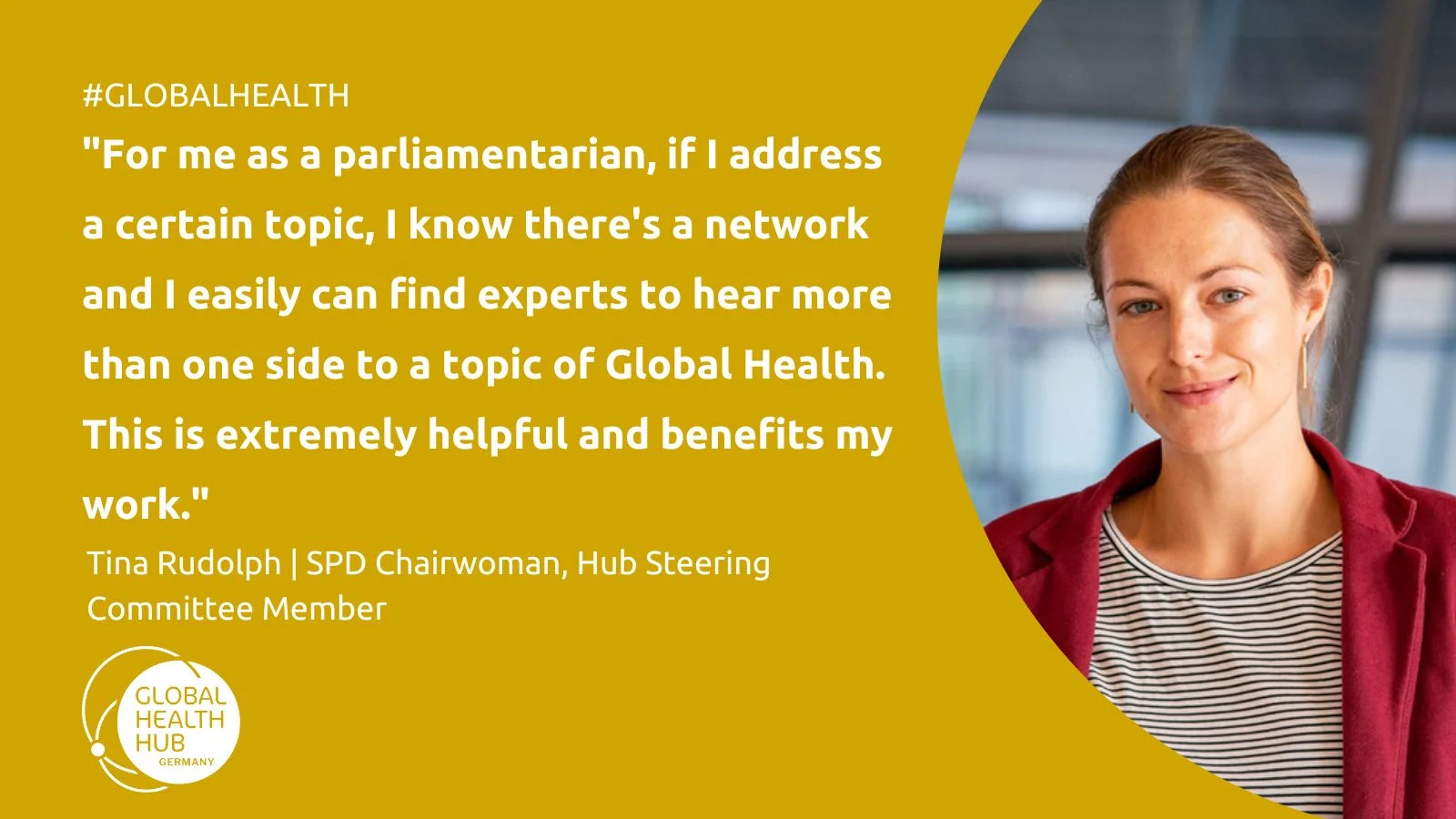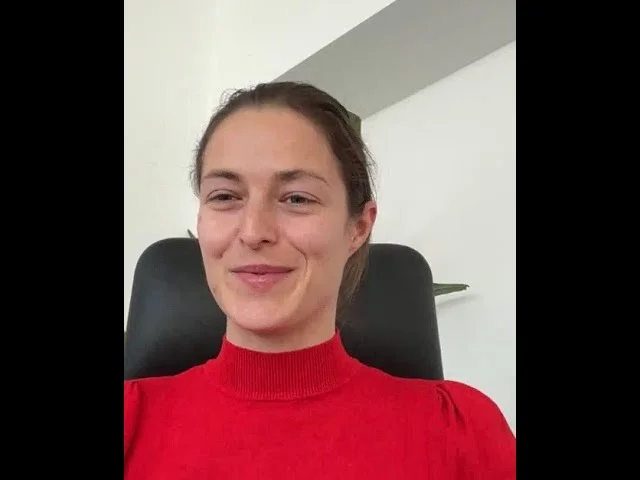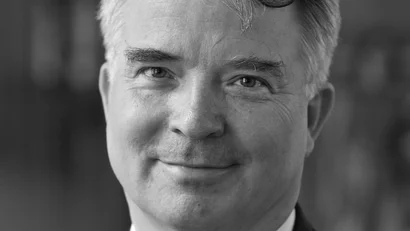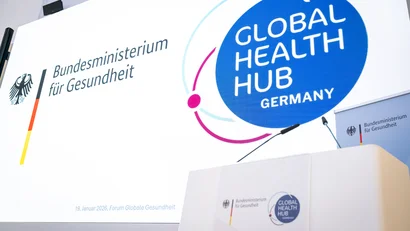Interview with Tina Rudolph about her work in the Subcommittee on Global Health
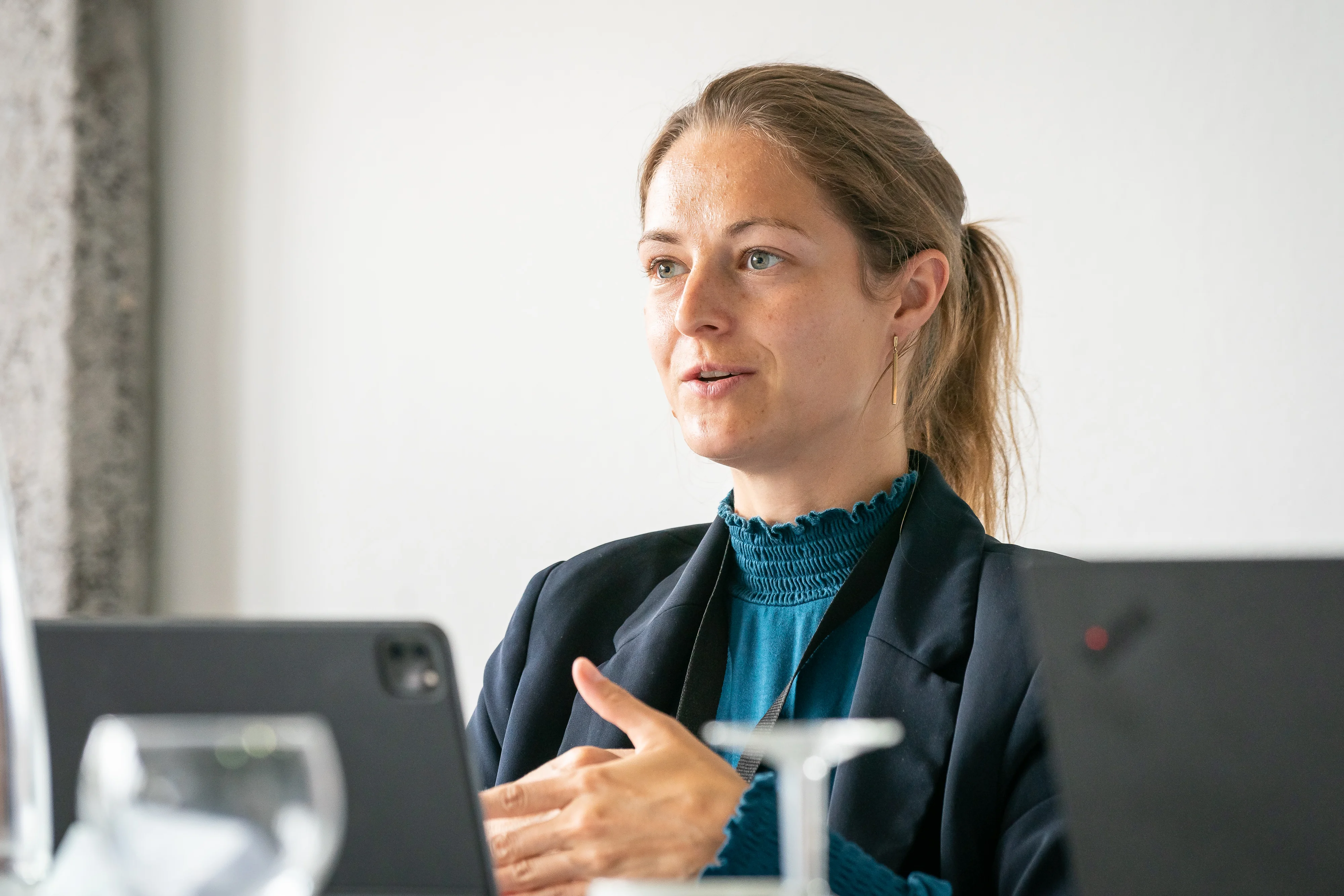
As part of our interview series “The Hub in conversation with...”, members of the parliament and representatives of ministries share insights into their work. For this issue, we interviewed Tina Rudolph, chairwoman for the SPD parliamentary group in the Subcommittee on Global Health and member of the Hub's steering committee.
Ms Rudolph, before you embarked on your political career, you were already a doctor and a medical ethicist. To what extent is the field of medical ethics important for your work in the Bundestag?
Tina Rudolph: Ethics as a field of practical philosophy deals with questions of what is right and what is just. When it comes to Global Health and to the question “Which responsibility people have towards each other but also in a global way?”, the questions of what is right and just become very important. Usually, political philosophy asks why people should take responsibility towards each other. And maybe you're familiar with the “contract theory” or other theories where people try to justify why we should care for each other. And I see myself in a tradition of Rawls, as an egalitarian liberal. It's the best way to explain why it's good for every person in a society to be responsible for each other. I do not see why we shouldn't extend this to a global context. And when you fully think this through, it's totally obvious that Global Health has to be our concern.
You are the chairwoman for the SPD parliamentary group in the Subcommittee on Global Health. One could say that Global Health as a concept is not quite yet as established in Germany and sometimes is still in need for an explanation. How would you explain to a child what Global Health means and what needs to happen to achieve it?
Tina Rudolph: I would explain that health needs to have a global dimension and that this has two directions. On the one hand the direction of responsibility and on the other hand the direction of being affected. When it comes to the direction of responsibility, I would argue that health is a fundamental human right. Every child would understand, if you're sick and cannot get treatment, then you are in a bad condition. And in a bad condition you cannot learn, you cannot work, you cannot do the things which are important in life. It's to justify why everybody is in need of health and why we should care for each other. When it comes to the direction of being affected, I would explain with the concept of One Health and underly it with examples: if in other parts of the world, when zoonoses are developed or when standards of production lead to antibiotics in the groundwater and you get antimicrobial resistance, then it's a problem for the whole world. So you cannot just care for yourself and care for health in your own country because everything is connected.
That sounds logical. Why do you think many people still don't understand the importance of the Global Health concept?
Tina Rudolph: The question is what obligation do we especially have towards other people? A lot of people think it's bad if people suffer in other parts of the world, but we cannot help them all. And sometimes it's the mere extension of the problem, like how much money must be spent to strengthen all the health systems to a point where we would say it's sufficient. This overload and this feeling like where to start and where to stop, is what sometimes makes it easier for people to say, “I'm not happy that people in other parts of the world are in a bad condition when it comes to health, but it's not my fault and therefore it's not my responsibility”. We have to emphasize that it’s not only about not doing harm and mitigating harm, but also that it's our responsibility to do so nevertheless and to strengthen the health systems worldwide.
In your speeches in the Bundestag, you repeatedly emphasize how important it is not only to strengthen the German health system, but also to invest in Global Health. Right now, however, budget negotiations are tense. How will you convince your colleagues in the Bundestag of the importance of investing in Global Health?
Tina Rudolph: When it comes to economics, the situation globally is tense. Budget negotiations in Germany are tense and so are they in many other countries. Nevertheless, we are aware that we cannot stop investing in important fields like Global Health. However, we were able to improve the budgets for some fields in the last budget negotiations. For example, the Global Fund received more funding than initially was suggested. Also, Germany still is paying and investing in research and development, for example, product development partnerships. Also, the budget for the WHO will improve dramatically until the year of 2030. This is something we, Germany, are quite proud of – though we know we couldn't have achieved it without other countries jumping in and supporting this suggestion. For the first time, we have a clear path how to achieve it. The WHO and all countries who are part of it will hopefully agree in May that the core budget of the WHO must be increased, that it needs to know what money tit can count on – which was not the case in the past. Also, a lot of the budget was earmarked from donors for certain projects and the WHO didn't have the freedom to decide when a problem occurred to say: ”Now we are allocating money to this”. I think these are examples where you can see that Global Health is still a topic of priority in Germany.
The subcommittee "Global Health" is not only attached to the Committee on Health, but also to the Committee on Economic Cooperation and Development. What does successful cooperation between the health and economic sectors in the context of development cooperation look like?
Tina Rudolph: Maybe this was a shift in the way we are seeing the cooperation between the Global South and Germany: In the past years cooperation and development were driven by the thought that we are helping other countries. Luckily, we are shifting from this thought towards a situation where we really mean that we want to cooperate and acknowledging that there are two parties, and they must work together. For example, when it comes to the production of pharmaceutical products and when it comes to sustainable supply chain which we need not only in a situation of another pandemic, but also to make the global health system resilient. We have to know, and we have to make sure that on every continent pharmaceutical production is possible to secure the access of people to medicine when they need it. Therefore, we cannot continue with the mindset that all high-tech goods, also high-tech medication is produced and can only be produced just in Europe or in some countries in North America. We have to see medication coverage and access to medicines as a global task, and we have to think more in global partnerships.
"Climate and Health" is one of your political priorities. In your opinion, is the importance of this causality recognised in the German health system?
Tina Rudolph: I would say it's starting to be recognised. We are still trying our best to gain recognition for the fact that you cannot just look at health without looking at the climate and at the health of our planet. During the last years there was also a rising interest from within the health sector. When you look at what we have to do in the health sector to achieve the climate neutral health system, it would be almost impossible just to do it from a political point of view. I as a politician cannot, and I also don't want to play this as a top- down process. We need it to be a bottom-up process. And luckily, I hear so many voices from within the health system from people who are longing to be a part of it. I really admire that a lot of colleagues in the medical field and from the health professions take the time to engage in debates or develop a strategy for the place they are working in.
But still we have to go further, and we have to especially make it clear for ourselves what investments are needed and whether we are willing to make them, and this will cost as a society. But, and this is also common knowledge, I would say that if we don't undertake these investments now, in the long run, it will cost much more.
What would you like to achieve as chairwoman for the SPD parliamentary group in the Subcommittee on Global Health until the end of the legislative period?
Tina Rudolph: I want to improve access to health and to the health systems worldwide. And I want to put the eyes on situations worldwide. What we are doing in the subcommittee is that we identify pressing fields in Global Health, we ask the question “What is the topic we definitely have to deal with also in this legislature?”. For example, the field of climate and health and the question of a sustainable and climate neutral health system in Germany and worldwide is one question we have to ask and answer. Other countries, for example Great Britain, took a few steps forward on this route with the NHS. For us as a sub- committee it is easy to draw attention to Global Health issues when there's a catastrophe somewhere in the world and it's on the media for two or three days. But we also need to further strengthen the silent problems like malaria, tuberculosis and HIV. Still every year millions of people die from those diseases alone. And also other poverty related and neglected tropical diseases which are a problem in countries where actually the financing is a problem, where people don't have access to health systems and where often effective vaccines, diagnostics or medicines are not available, because there is a lack of research and development for many diseases affecting the Global South. We have to address all of these problems and we have to play and to pay our part to strengthen health systems worldwide. At the same time we have to pay our part to strengthen health systems worldwide.
So how exactly does the subcommittee work?
Tina Rudolph: We have a monthly meeting where we can invite speakers from all over the world, thanks to digitalization, and where we address topics which we identify as being core to the field of Global Health. The subcommittee can raise awareness, e.g., the meetings of the subcommittee recently started to be public. I think for NGO's it's a good opportunity to know what the subcommittee is talking about and to get an impression of the debate and also ask “Is the Parliament dealing with the right questions when it comes to Global Health?”. And we have our goal set. We have a strategy about Global Health of the German Government, which is very much related to the Sustainable Development Goals (SDGs). As a subcommittee, it's also our responsibility to make sure that this strategy is appropriately implemented, but also evaluated and – if necessary – revised. What we also do as a subcommittee is to discuss the topics which are important in international fora like G7, G20, WHA or UN assemblies and here the subcommittee provides impulses to support the work of the German delegations to these fora.
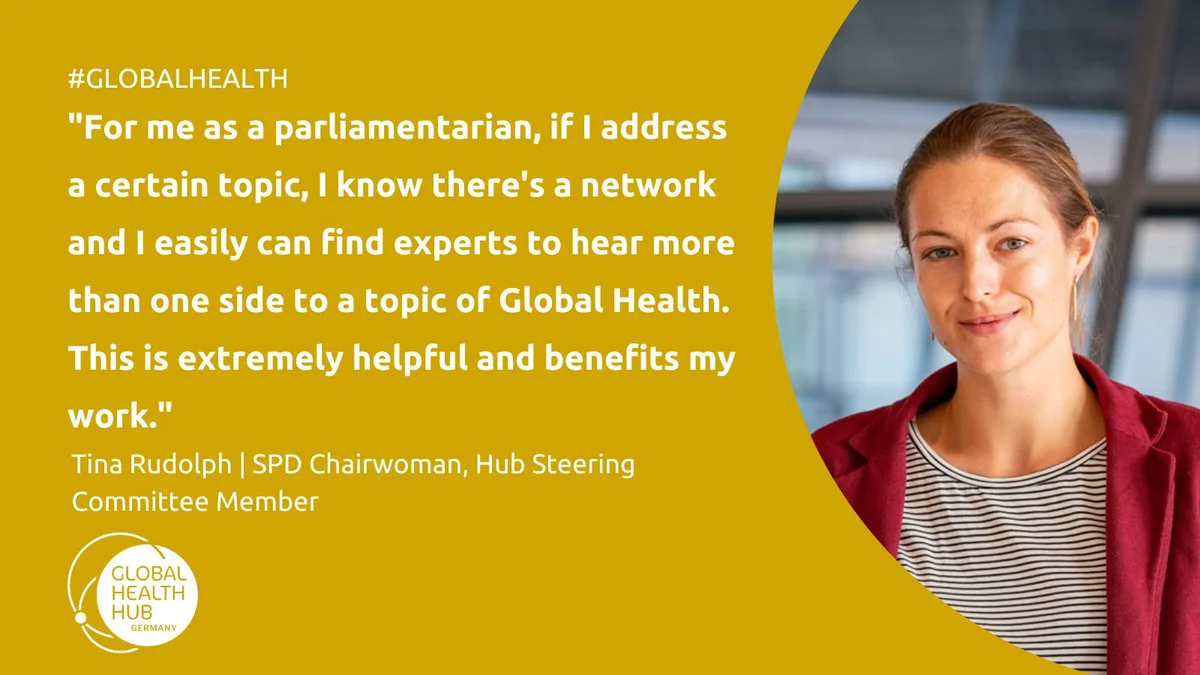
You are also a member of the steering committee of the Global Health Hub Germany. How does the Global Health Hub Germany benefit your work in the Subcommittee on Global Health and the other way round?
Tina Rudolph: It's great that the Hub brings together people who work and who are engaged in the field of Global Health so they can benefit from the connection and from the networks within the Hub. I come from the Northeast of Germany, I grew up in Mecklenburg-Vorpommern and when I think back 15 years ago, so when I was 15, 16 or 17, if I would have developed an interest in Global Health already back then, it would have been almost impossible for me to get a connection. Usually, you find a lot of actors in the field of Global Health in a certain region. In Germany, of course it's Berlin. But the Hub brings people together and opens the door for people who are not living in Berlin, but who are extremely benefiting by being able to participate in what the Hub has to offer. And I like the structured approach that there are usually one or two topics a year where the Hub especially deals with and brings experts together and for me as a parliamentarian of course if I try to address a certain topic, I know there's a network and I easily can find experts to hear more than one side to a topic of Global Health. So, this is extremely helpful and benefits my work.
This interview was conducted by Sabrina Rupprecht.
Interview with Tina Rudolph about her work in the Subcommittee on Global Health
Read further interviews from our series “The Hub in conversation with...”:
Related Articles
![[Translate to English:] [Translate to English:]](/fileadmin/_processed_/8/c/csm_freepik_Titelbild_4d8392c06a.webp)
